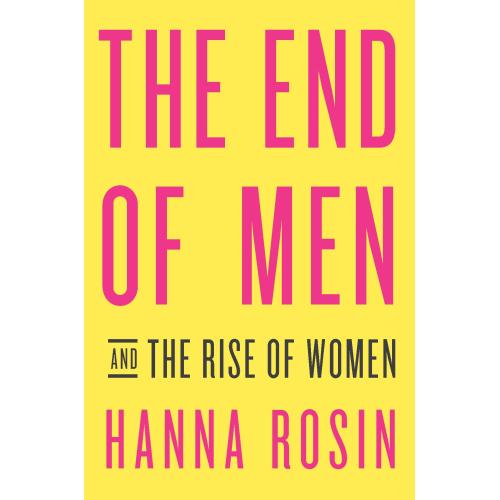So I’ve been reading Hanna Rosin’s The End of Men (2012)—why? out of sheer obstinacy, no doubt—which is at turns annoying, blockheaded, fascinating, fun, and scary. And for all those responses, it must be doing something right. I would have loved to review this one when it first appeared. It’s a study in contrasts: the first chapter, which at times reads as both gullible and myopic, is about sex, especially of the (mythic) “hook-up” variety, and for my money, should have been placed elsewhere, if not eliminated altogether. It’s the least convincing section of the book, and right out front. But after that unfortunate beginning, some of the chapters are both fascinating, and, at times, unintentionally funny. I’d love to do a parody of the typical anecdote in one of the later chapters. The pattern works something like this: It depicts a hard-working young woman somehow romantically linked/shacked up with a loser boyfriend/do-nothing husband, and how their typical day unfolds. All through the use of ‘semi-fictional’ identities, full of demographic tags: “Rebecca, 31, a part-time paralegal who is working her way through law school, gets up early to make breakfast for her six-year-old daughter, Jasmine, and her loser boyfriend, Chuck, 33 (and looking a lot like 40). Chuck hasn’t worked since his car broke down on the freeway two years ago, when he was fired after he walked home, dispirited, and cried on the phone while complaining about his bad luck to his mother. Chuck spends most of his day eating pizza, masturbating, and watching reruns of Nascar races or football games. He’s decided to grow a beard, and tries to help out with the care of young Jasmine, but really, he’s hopeless. Meanwhile Rebecca works all day, comes home and studies Chinese for two hours, and now and then takes advantage of the sexually available Chuck to relieve some tension.” It’s funny in its own way, and sad, too: Much as I can laugh at it, and feel superior (Hey, I don’t eat that much pizza, and I do have a job), I have to begrudgingly admit that at times her anecdotes more or less accurately describe the 21st century Feckless Male. The book has more in common with Charles Murray’s Coming Apart: The State of White America, 1960-2010 (2012) than it would like to admit (Rosin being a Liberal feminist, and Murray most definitely not), I’m sure. It also spawns some juicy knee-jerk reactions, like this amusing one, here. I think everyone should read it, if for no other reason than to give us something to argue about, and a laugh in the same breath.

- October 2023
- September 2023
- September 2021
- April 2020
- September 2019
- May 2019
- August 2018
- February 2018
- January 2018
- October 2017
- August 2017
- June 2017
- May 2017
- March 2017
- February 2017
- November 2016
- October 2016
- May 2016
- April 2016
- March 2016
- February 2016
- January 2016
- November 2015
- October 2015
- September 2015
- June 2015
- May 2015
- April 2015
- March 2015
- December 2014
- September 2014
- August 2014
- May 2014
- March 2014
- February 2014
- January 2014
- December 2013
- November 2013
- October 2013
- September 2013
- August 2013
- July 2013
- June 2013
- May 2013
- April 2013
- March 2013
- February 2013
- January 2013
- December 2012
- November 2012
- October 2012
- September 2012
- August 2012
- July 2012
- June 2012
- May 2012
- April 2012
- March 2012
- February 2012
- January 2012
- December 2011
- November 2011
- October 2011
- September 2011
- August 2011
- July 2011
- June 2011
- May 2011
- April 2011
- March 2011
- February 2011
- January 2011
- December 2010
- November 2010
- October 2010
- September 2010
- August 2010
- July 2010
- June 2010
- May 2010
- April 2010
- March 2010
- February 2010
- January 2010
- December 2009
- November 2009
- October 2009
- September 2009
- August 2009
- July 2009
- June 2009
- May 2009
- April 2009
- March 2009
Recent Posts
- Aliens Among Us: Probing Hillbillies and Freaking Shut-ins, How Netflix’s “Encounters” and Hulu’s “No One Will Save You” Prep Us for the Coming Alien Apocalypse, Kind of
- My Life as a Bob Odenkirk Character: On How Watching Netflix’s Black Mirror episode “Joan Is Awful” Mimicked My Experience of Watching the AMC series Lucky Hank
- “Bobcats, Bobcats, Bobcats”: Animal Life and a Tribute to “Modern Family”
- “The North Water”: This Ain’t Your Daddy’s Moby Dick
- Day 25: On David Quammen's "Spillover": Terrific Book That Foretold Our Pandemic, Kind of
Recent Comments
No comments to show.
